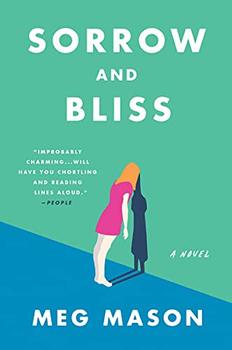Summary | Excerpt | Reviews | Beyond the Book | Readalikes | Genres & Themes | Author Bio

Growing up, people thought we were twins. We were desperate to dress alike, but our mother said no. Ingrid said, "Why can't we?"
"Because people will think it's my idea." She looked around the room we were in at the time. "None of this was my idea."
Later, when we were both in the grip of puberty, our mother said that since Ingrid was evidently getting all the bust, we could only hope I'd end up with the brains. We asked her which was better. She said it was better to have both or neither; one without the other was invariably lethal.
My sister and I still look alike. Our jaws are similarly too square but according to our mother we somehow get away with it. Our hair has the same tendency towards stragglyness, has generally always been long, and was the same blondish color until I turned thirty-nine and realized in the morning that I could not stop forty from coming. In the afternoon, I got it cut to too-square jaw-length, then went home and bleached it with supermarket dye. Ingrid came over while I was doing it and used the rest. Both of us struggled with its upkeep. Ingrid said it would have been less work just to have another baby.
I have known since I was young that, although we are so similar, people think Ingrid is more beautiful than I am. I told my father once. He said, "They might look at her first. But they'll want to look at you for longer."
* * *
In the car on the way home from the last party Patrick and I went to, I said, "When you do that pointing thing it makes me want to shoot you with an actual gun." My voice was dry and mean and I hated it—and Patrick when he said, "Great, thanks" with no emotion at all.
"I don't mean in the face. More like a warning shot in the knee or somewhere that you could still go to work."
He said good to know and put our address into Google Maps.
We had lived in the same house in Oxford for seven years. I pointed that out. He didn't say anything and I looked across at him in the driver's seat, waiting calmly for a break in the traffic. "Now you're doing the jaw thing."
"I know what, Martha. How about we don't talk until we get home." He took his phone out of the bracket and closed it silently into the glove box.
I said something else, then leaned forward and put the heater on to its highest setting. As soon as the car became stifling, I turned it off and lowered my window all the way. It was crusted with ice and made a scraping noise as it went down.
It used to be a joke between us, that in everything I swing between extremes and he lives his entire life on the middle setting. Before I got out, I said, "That orange light is still on." Patrick told me he was planning to get oil the next day, turned off the car, and went into the house without waiting for me.
* * *
We took the house on a temporary lease, in case things didn't work out and I wanted to go back to London. Patrick had suggested Oxford because it is where he went to university and he thought that, compared to other places, commuter towns in the home counties, I might find it easier to make friends. We extended the lease by six months, fourteen times, as though things could not work out at any moment.
The letting agent told us it was an Executive Home, in an Executive Development, and therefore perfect for us—even though neither of us are executives. One of us is a specialist in intensive care. One of us writes a funny food column for Waitrose magazine and has googled "Kate Moss rehab which one?" while her husband is at work.
In physical terms, the Executive nature of it manifested as expanses of taupe carpet and a multitude of non-standard sockets and, to me, as a permanent sense of unease whenever I was there alone. A box room on the top floor was the only room that did not make me feel like there was someone behind me because it was small and there was a plane tree out the window. In summer it obscured the view of identical Executive Homes on the other side of the cul-de-sac. In autumn, dead leaves blew inside and mitigated the carpet. The box room was where I worked even though, as I was often reminded by strangers in social settings, writing is something I can do anywhere.
Excerpted from Sorrow and Bliss by Meg Mason. Copyright © 2021 by Meg Mason. Excerpted by permission of Harper. All rights reserved. No part of this excerpt may be reproduced or reprinted without permission in writing from the publisher.
Your guide toexceptional books
BookBrowse seeks out and recommends the best in contemporary fiction and nonfiction—books that not only engage and entertain but also deepen our understanding of ourselves and the world around us.